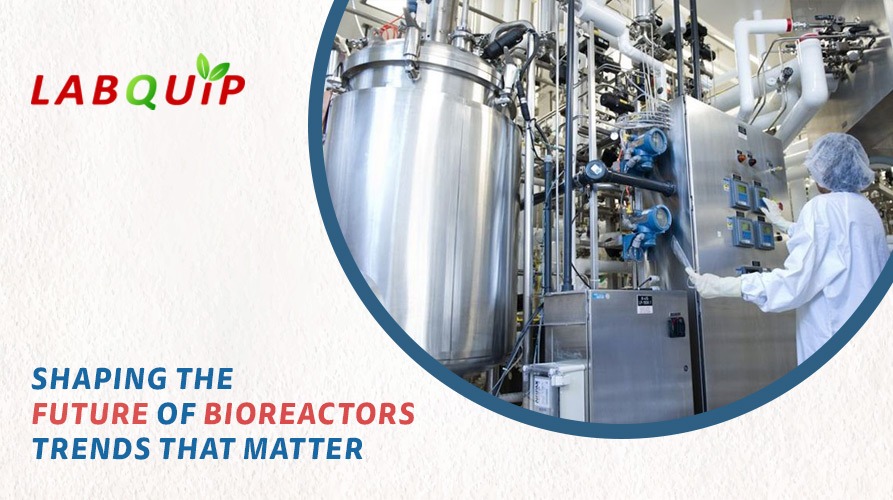The Future of Bioreactors: Trends, Innovations & Industry Impact
Bioreactors are now not just equipment in a lab. They’re converting complete industries with new technology, making them smarter, greener and more reliable than ever. As the era advances, bioreactors are evolving, supplying solutions that promise higher yields, management, and lower costs.
In this blog, we will take a deep dive into the trends shaping bioreactors’ future and how they may be making a difference across several industries.
Key Trends Shaping the Future of Bioreactors
- Single-Use Bioreactors: Flexibility and cost savings
Traditionally, bioreactors required sizable cleaning and sterilization. which frequently caused lengthy downtimes and further expenses. Enter single-use bioreactors! This disposable equipment is a game-changer, reducing infection dangers and rushing up production.
It’s also incredibly flexible, making it perfect for vaccine development and regenerative medicine. Plus, it’s smooth to scale, supporting researchers and producers in meeting demand with fewer headaches.
- Food and Agriculture Innovations
Bioreactors are also shaking things up in the food industry. Fermentation-based products, together with plant-primarily based dairy alternatives, are benefiting from more desirable bioreactor technologies that raise performance and product satisfaction.
- Modular and Scalable Bioreactors: Adapting to Demand
As personalised medicine and niche biotech products keep growing in demand, modular bioreactors are becoming important. These structures provide flexibility, with scalable structures, both researchers and large-scale manufacturers can optimize their techniques and quickly adapt to ever-changing marketplace desires. It’s all about performance and adaptability in this fast-paced industry!
- Advanced Sensor Technology: Real-Time Monitoring
Bioreactors have become much smarter thanks to excessive-precision sensors that may tune microbial increase, nutrient tiers, and metabolic activities in real-time.
This continuous monitoring guarantees that bioprocesses run easily, minimizing waste and improving consistency. With real-time information, manufacturers can maintain top-notch fine control, ensuring every batch meets enterprise requirements. It’s all approximately precision and performance, with a focal point on exceptional and reproducibility.
Future Applications of Bioreactors
Bioreactors are opening doors to exciting possibilities in various industries. Here are some ways they’re already making an effect:
- Pharmaceutical Advancements
Bioreactors are revolutionizing drug production by ensuring consistent, super pharmaceuticals with minimal human intervention. As biologics (like monoclonal antibodies and vaccines) take centre level, bioreactors are gambling an essential position in huge-scale production.
- Food and Agriculture Innovations
Bioreactors are also shaking things up in the food industry. On the pinnacle of that, fermentation-based products, together with plant-primarily based dairy options, are benefiting from more suitable bioreactor technologies that improve overall performance and product satisfaction.
- Environmental Sustainability
Bioreactors aren’t pretty much-producing products—they additionally support saving the planet!
They’re used in wastewater treatments to break down pollution into biodegradable substances, making the procedure more efficient. Plus, bioreactors are being executed in biofuel manufacturing, imparting an eco-friendly choice to fossil fuels.
Challenges and Considerations
While bioreactors are advancing at an incredible pace, there are still a few demanding situations to conquer:
- High Initial Costs
Investing in the modern bioreactor technology can be expensive. The upfront prices can be a barrier for some organizations, but the long-term advantages—consisting of advanced efficiency and sustainability—frequently outweigh the investment.
- Regulatory Compliance
With stricter guidelines in place, bioreactors want to meet safety requirements. This method involves ongoing testing, monitoring, and certification to ensure they’re up to code.
- Process Optimization
Technology is advancing, but it’s now not a “set it and forget it” challenge. To maximize performance and productiveness, monitoring is important.
- Material Innovation
While bioreactor designs are evolving, finding cost-effective and long-lasting materials remains a challenge. Researchers are constantly running to develop higher substances that provide both overall performance and value savings.
- Workforce Training
As bioreactor technology keeps adapting, there’s a developing want for skilled employees who can work and maintain those superior systems.
Conclusion
Bioreactors are no longer the simplest equipment in the lab—they may be a pressure in industries from pharmaceuticals to food manufacturing to environmental sustainability. With innovations in energy efficiency, customization, and real-time monitoring, bioreactors are shaping the future of biotechnology.
As technology continues to conform, we will assume even more breakthroughs in drug manufacturing, personalized remedies, and green solutions. Companies that embody those improvements will no longer enhance their productiveness but also make contributions to a more sustainable future for us all.
FAQs About Bioreactors
Q.1: What are a bioreactors used for?
A.1: Bioreactors are used to domesticate cells, bacteria and microorganisms for producing pharmaceuticals, biofuels, food products and environmental answers.
Q.2: How do single-use bioreactors differ from traditional ones?
A.2: Single-use bioreactors use disposable components, lowering infection dangers and making them more powerful.
Q.3: What industries benefit most from bioreactors?
A.3: Bioreactors are critical in pharmaceuticals, food manufacturing, agriculture, environmental sustainability and biofuel industries.
Q.4: Are bioreactors power-efficient?
A.4: Yes! Modern bioreactors feature power-efficient designs, along with advanced aeration renewable energy integrations.
Q.5: What is the future of bioreactors?
A.5: The future of bioreactors is centred on making them modular, scalable and green, offering more efficient, cost-effective and sustainable solutions for production.
For more details, visit Labquip Asia!

